CARE’s end-of-year address from Professor Mohan J Dutta, Dean’s Chair and Director of CARE via YouTube and Facebook.
Link to Facebook : https://www.facebook.com/CAREMassey/videos/891000409006859

Center for Culture-Centered Approach to Research and Evaluation
CARE’s end-of-year address from Professor Mohan J Dutta, Dean’s Chair and Director of CARE via YouTube and Facebook.
Link to Facebook : https://www.facebook.com/CAREMassey/videos/891000409006859
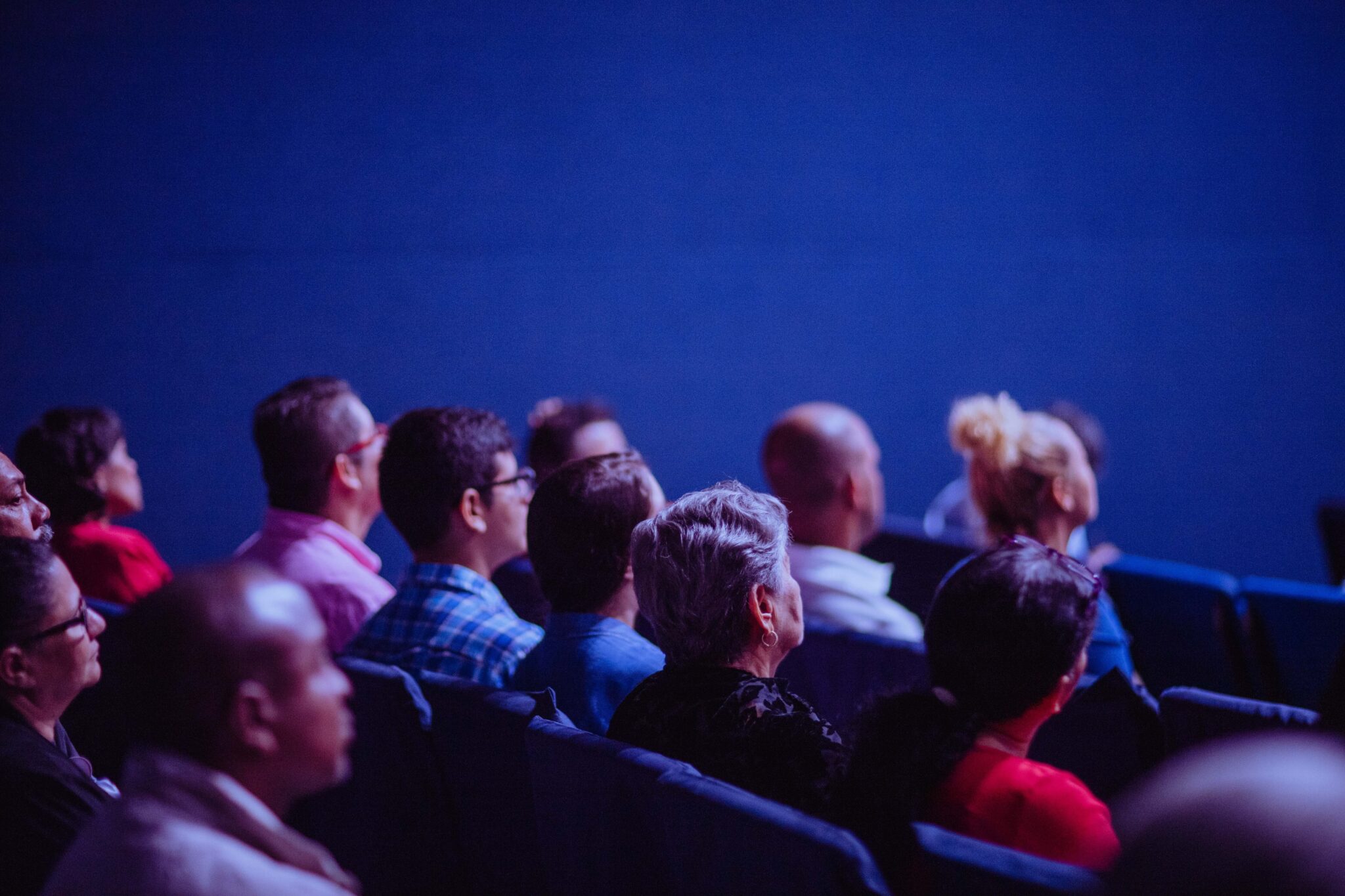
All attendees are invited to NCA Scholars’ Office Hours on Friday, Nov. 17, from 2 to 3:15 p.m. at the Gaylord National Harbor Convention Center.
This annual session provides seasoned scholars, junior scholars, and graduate students the opportunity to network and connect with each other in an informal and interactive atmosphere focused on mentorship. Participants can also meet the current NCA journal editors at the session.
Keeping with the convention’s theme – “Freedom” – this year’s Scholars’ Office Hours expands what it means to be a “senior” scholar in the field of Communication. Participants can expect to meet and speak with scholars who are well-published and advanced in their careers.
At the same time, the session will center scholars who advance community-engaged scholarship, activism, and other non-traditional communication work. We are thinking specifically of scholars who “free up” or open the discipline to new ways of thinking and doing communication work, thereby pushing the discipline forward in transformative ways.
We have assembled an eclectic and diverse group of scholars who cut across multiple areas of the field. To see the full list of participating senior scholars, visit NCA Convention Central.
If you are a graduate student, new tenure track faculty member or adjunct faculty member, you are especially encouraged to attend! We are particularly excited to welcome Black, Indigenous, and early career scholars of color, LGBTQI scholars, and scholars negotiating different abilities working at diverse intersections.
If you have any questions about the program, please feel free to reach out to co-planners Mohan Dutta and Rebecca de Souza. We are excited for you to join us and start networking!
Mohan Dutta, Scholars’ Office Hours Co-planner, Massey University, New Zealand
Rebecca de Souza, Scholars’ Office Hours Co-planner, San Diego State University
CARE: Center for Culture-Centered Approach to Research and Evaluation congratulates its Director, Professor Mohan J. Dutta, Massey University for being named in the latest World’s Top 2% Scientists List (Stanford University). The excellence in the research impact at CARE is reflective of the contributions of our collective of community advisory groups, community researchers, activists-in-residence, and academic research teams working tirelessly to build strong communities as participants in organizing for social change.
We are proud of this recognition of excellence that speaks to the impact our collective scholarship makes to the theorizing of justice-based health communication processes, demonstrating the power of culture-centered community-based communication organizing for social change in transforming colonial, capitalist, patriarchal, racist and casteist structures.
Check out the Dataset- https://elsevier.digitalcommonsdata.com/data…/btchxktzyw/4
Photo by Vivien Beduya.
#ElsevierBV #CAREMassey #WorldsTopScientistsList #CultureCenteredApproach #CommunityBasedCommunication #SocialChange #HealthCommunication #StanfordUniversity #CARECCA #MasseyUni
Join us online and celebrate the many accomplishments featured in the CARE documentary.
Facebook: https://www.facebook.com/CAREMassey/videos/3699987516946842
https://www.massey.ac.nz/about/news/care-to-celebrate-10-year-anniversary-with-conference/
On this Gandhi Jayanti, reflecting on the ways in which Gandhi’s experiments with truth resist and challenge the communicative infrastructure of deception that forms the discursive basis of the fascist politics of Hindutva.
“As a fascist ideology, Hindutva thrives on the production and circulation of lies, continually at work to vilify India’s Muslim minorities.
This deception, communicating contradictory and conflicting messages internally and externally, actively producing misinformation, and mobilizing violence on the basis of the misinformation, lies at the crux of the organizing of hate as a technique for rule.
Deception forms the everyday habits of Hindutva, drawing from the Brahminical hierarchy that gives it its conceptual formation. Brahminism as the underlying feature of Hindutva mobilizes the practices of deception.
From the active production of disinformation in the form of conspiracy theories to practices based on lies in everyday life, the communicative infrastructure of Hindutva thrives on deception.”
This article first appeared on the culture-centered blog.
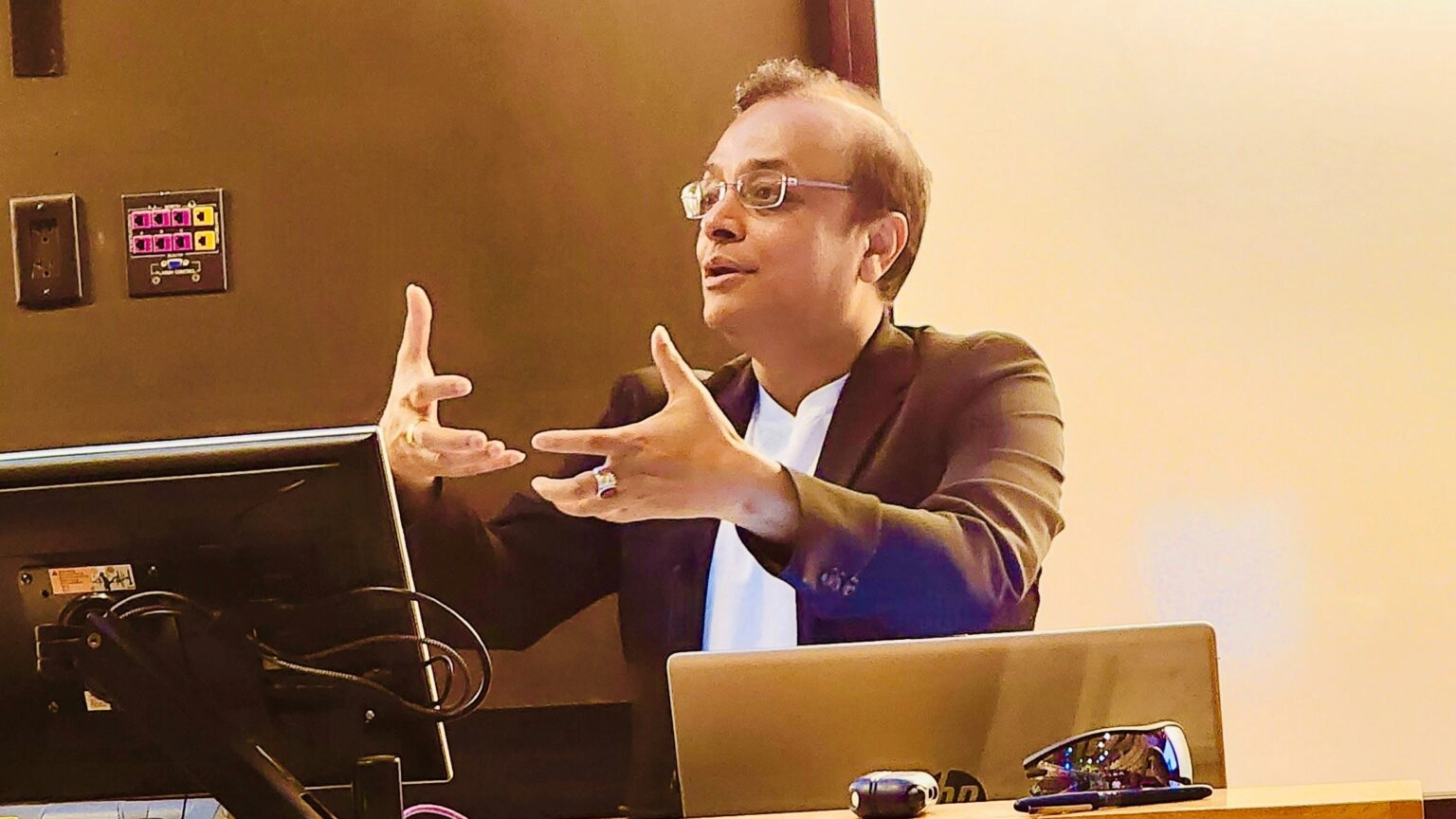
Professor Mohan Dutta, Dean’s Chair Professor of Communication and the Director of the Center for Culture-centered Approach to Research and Evaluation (CARE) will deliver the 2023 G. Jack Gravlee endowed lecture in the Department of Communication Studies at Colorado State University on September 19, 2023.
Professor Dutta’s lecture, titled “Decolonization as organizing radical democracies: Centering health, resisting climate colonialism, securing food systems, and resisting hate” will be delivered in conversation with the University’s theme this coming year (2023-2024), Democracy and Civic Engagement.
The lecture will draw upon two decades of ethnographic fieldwork carried out by Mohan Dutta in struggles for Indigenous rights, migrant rights, transgender rights, anti-racism, and working-class politics, exploring the everyday habits of democracy that are sustained through community action.
The talk will outline the key tenets of the culture-centered approach as an organising framework for decolonizing democracies, attending to Indigenous, Black, and various Global South traditions for organising democracies. It will attend to the ways in which white supremacy shapes the infrastructures of settler colonial/postcolonial/neocolonial democracies, with hegemonic notions of democracy scripted into practices of extraction, expulsion, and displacement through the mobilisation of violence.
Professor Dutta will wrap up the talk by offering insights into the organising work of building transformative democracies through the co-creation of community voice infrastructures that work toward achieving the United Nations Sustainable Development Goals, addressing the challenges of climate colonialism, food insecurity, poverty, and digital colonialism.
Professor Mohan Dutta delivers Gravlee Lecture at Colorado State University
CARE: Center for Culture-Centered Approach to Research and Evaluation congratulates Professor Mohan Dutta for his role as incoming Chair of the Ethnicity and Race in Communication (ERIC) division of the International Communication Association

The Ethnicity and Race in Communication Division is concerned with methodological approaches and research that apply, extend, or develop communication theory and analysis through an examination of race and ethnicity within local, international, and transnational contexts.
The division also works to advocate for the improved status, representation, and opportunities for underrepresented scholars in communication. Professor Dutta will serve as the 2023 conference planner for the 2024 ICA conference, themed “Communication and Global Human Rights.”
#CARECCA #CAREMassey #CAREUni #MohanDutta #ICAHDQ #ICAConference #Ethnicity #Race #CommunicationDivision #InternationalCommunicationAssociation #Communication #GlobalHumanRights #ICA2024
CARE White Paper Launch: White Paper On Hindutva Organizations In Aotearoa on Monday, 14th August 2023 with Prof. Mohan Dutta, Balamohan Shingade & Richa Sharma.
Joins us LIVE at 7 pm NZST via Facebook and YouTube to learn more about this important CARE White Paper on the Hindutva.
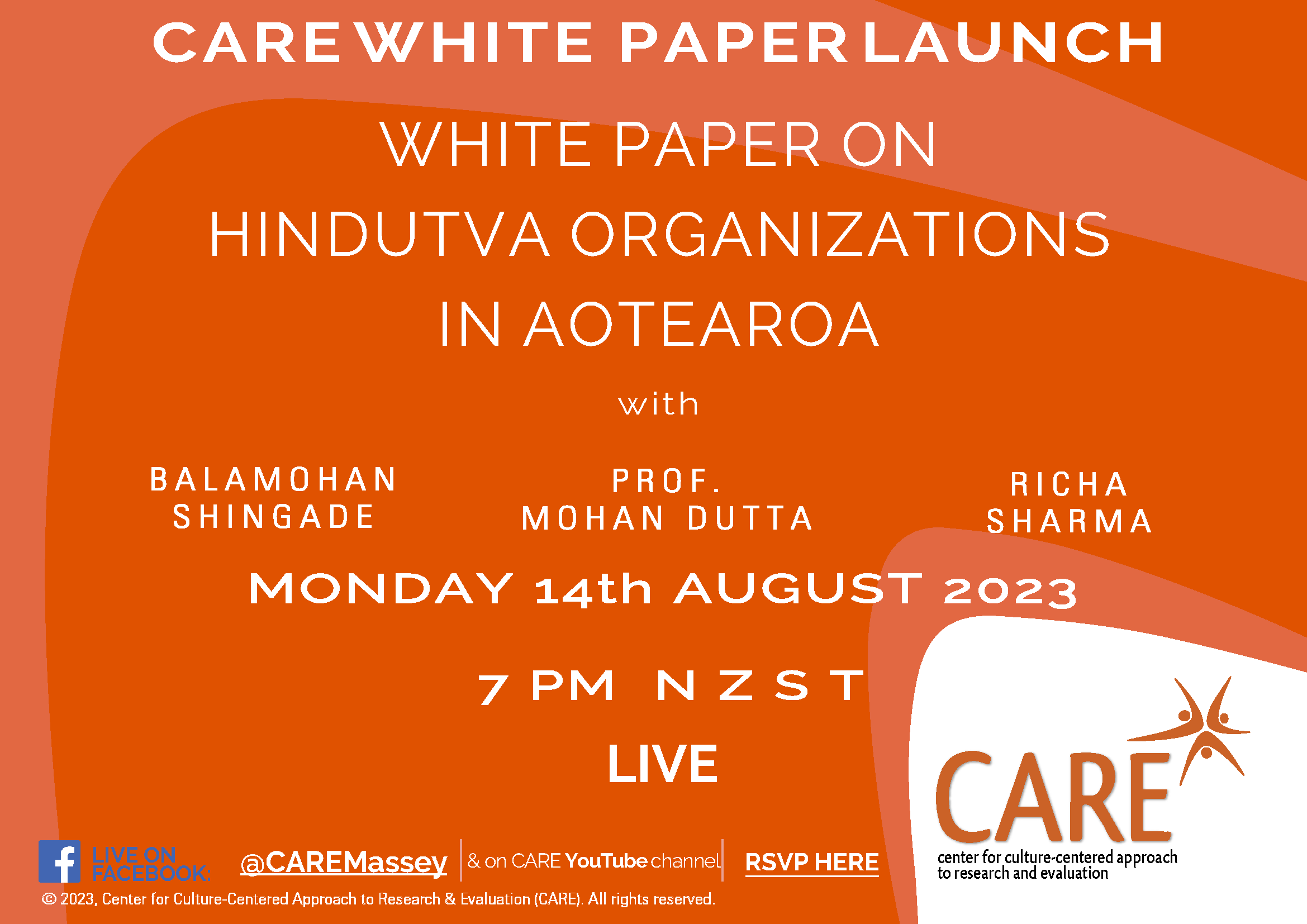
CAREWhitePaper On Hindutva Organizations In Aotearoa
Center for Culture-Centered Approach to Research and Evaluation is proud to launch CARE White Paper Issue #18: Māori-Migrant solidarities in resisting white supremacy with Tina Ngata & Prof. Mohan Dutta in two versions including the community version 1.0 as below.
The White Paper Issue #18 is the result of the collaborative work of Tina Ngata & Prof. Mohan Dutta during the Activist In Residence Programme (AIRP) 15th – 18th May 2023 @ CARE: Center for Culture-Centered Approach to Research and Evaluation.
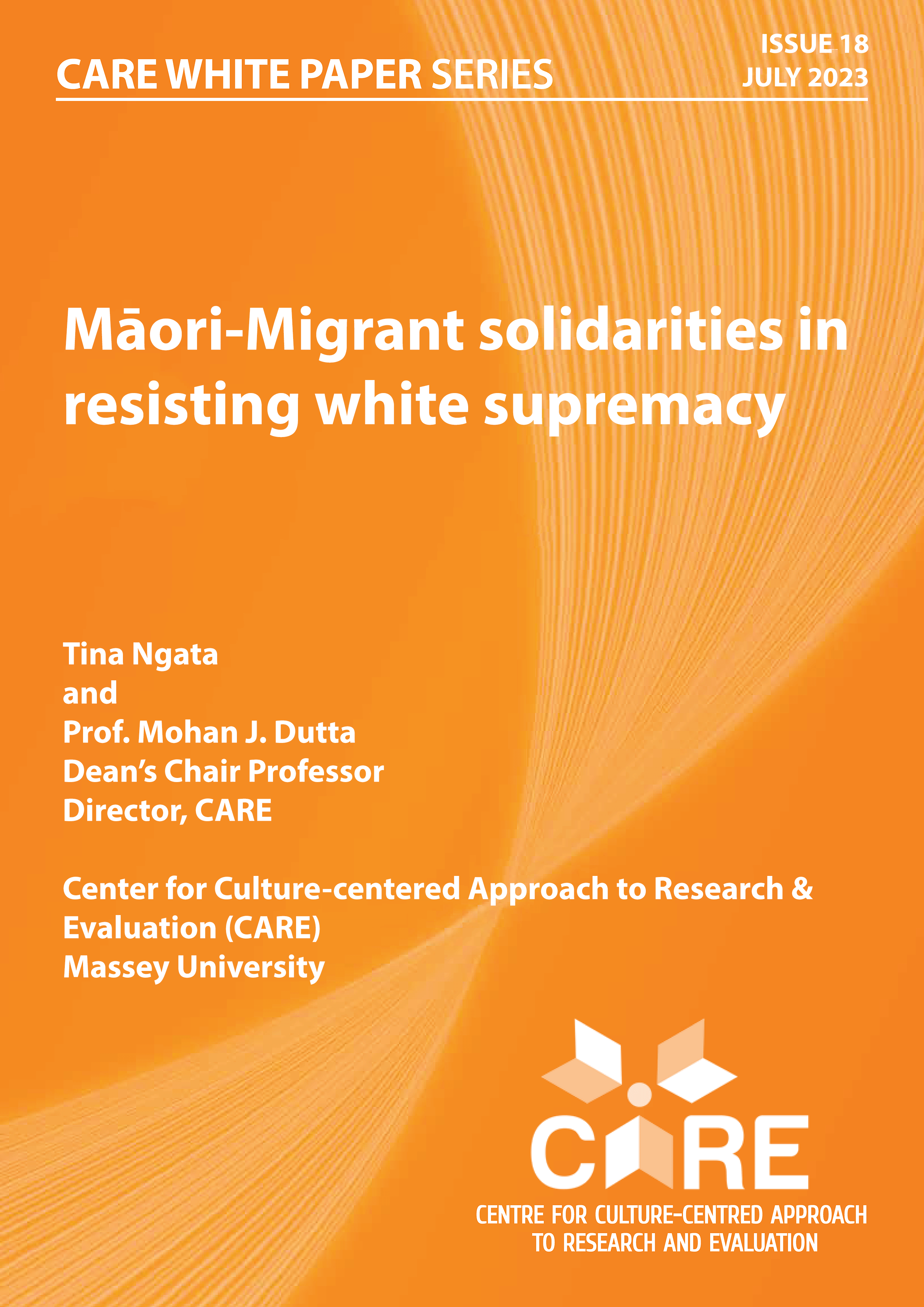
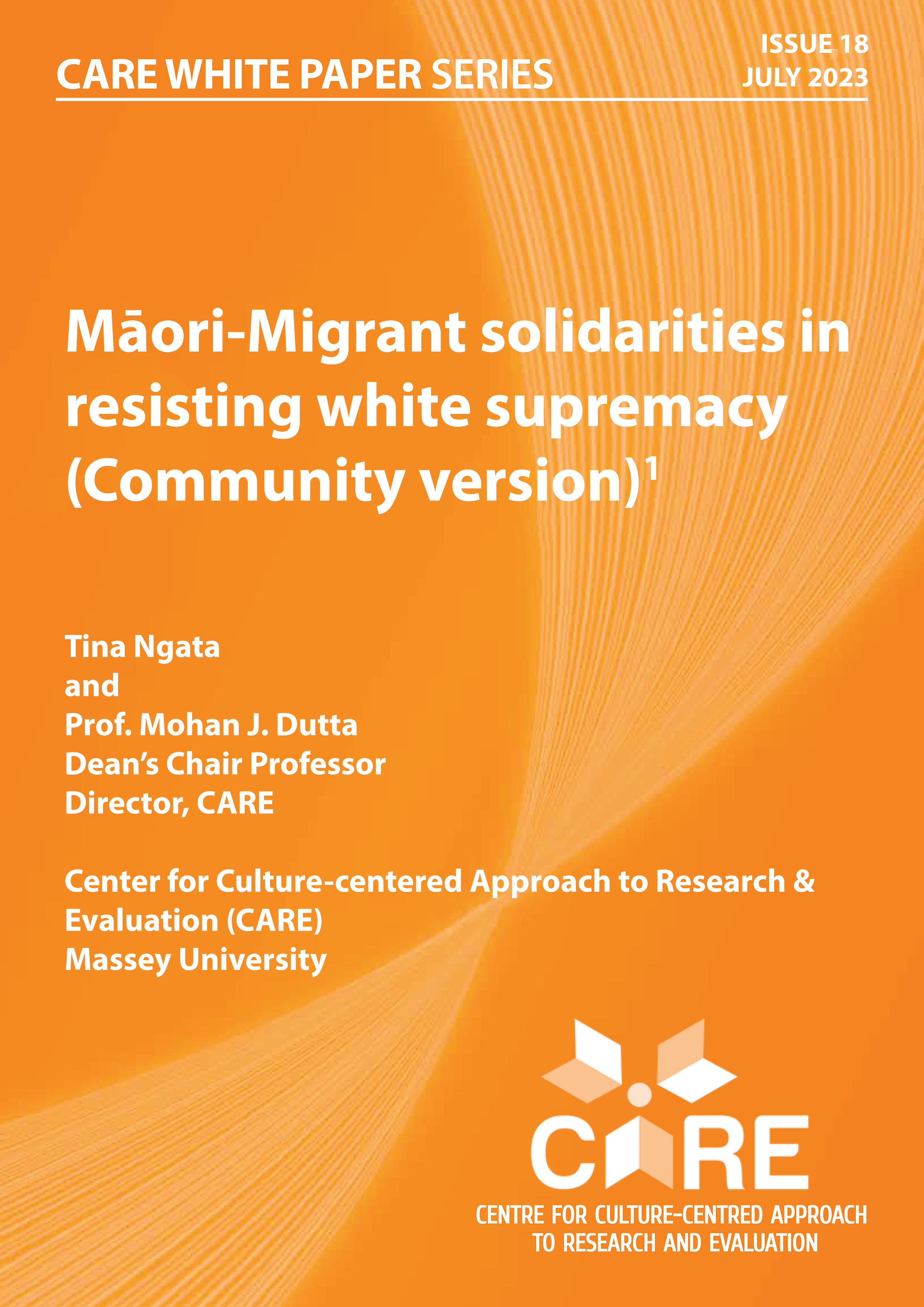
Opinion: The Far-Right, Misinformation, and Academic Freedom
By Professor Mohan Dutta | Tuesday 1 August 2023
This opinion piece is the second of a five-part series on the organised attack of the far right on communication and media studies pedagogy. This ecosystem has picked me as a sample case for all that is wrong with the discipline as a propaganda instrument of what it terms the “Left Woke Agenda.”
The far-right thrives on hate.
Hate is both a political and an economic tool. It drives profits, both for the producers of hate and the platforms carrying the hate.
Hate delivers an ever-expanding global market of readers/viewers/listeners.
Moreover, it delivers a political market. That’s why hate proliferates in election cycles, building up to elections. Whether it is Modi’s Hindutva, Bolsonaro’s Brazilian Christo-fascism, or Trump’s white supremacist Christian nationalism, far-right authoritarian strategies depend on hate to take over democratic processes and spaces. One of the cornerstones in the political mobilisation of the far-right across these movements is the attack on education and learning, seeking to replace critical education with propaganda upholding the majoritarian ideology (consider here the convergence in the attacks on history curricula), activated around drummed-up fears of what the youth are being fed in schools. Moreover, the ideology seeks to redo learning as a vocation and technique, framing critical pedagogy as propaganda that doesn’t belong in the classroom.
At its core, the mobilisation of hate to attack pedagogy seeks to retain power in the hands of the elite.
Hate lies at the core of the neoliberal attack on public resources. Conservative political parties, think tanks, and media work hand-in-hand to mobilise hate as a strategy for organising systemic attacks on public services, public education, and public pensions etcetera. Consider the mobilisation of attacks on critical race theory as part of this broader agenda of attacking public schools, catalysing the privatisation of education, an agenda aggressively pursued by right-wing think tanks in the United States, and globally, with key ideas originating from the US right-wing infrastructure.
In a speech delivered at the National Archives Museum in 2020, Trump attacked critical race theory by stating that it encourages “deceptions, falsehoods and lies” by the “left-wing cultural revolution”.
Suggesting that students in US universities are inundated with what he terms “critical race theory propaganda,” Trump said, “This is a Marxist doctrine holding that America is a wicked and racist nation, that even young children are complicit in oppression, and that our entire society must be radically transformed. Critical race theory is being forced into our children’s schools, it’s being imposed into workplace trainings, and it’s being deployed to rip apart friends, neighbours, and families.”
The Trump ban on critical race theory, formally known as Executive Order 13950, catalysed systemic attacks on the teaching of critical race theory across institutions by far-right politicians in all but one US states, threatening schools with the loss of funds. Higher education institutions are at the core of the targeted attack by the far-right because research and teaching around critical thought and analysis, reasoned argumentation, and informed public discourse are seen as originating from these institutions. This organised attack on Critical Race Theory, funded by dark money, forms a core infrastructure of the far-right, mainstreamed into right-wing policies targeting Critical Race Theory globally (see examples of the attacks in the UK, Australia, and in Aotearoa New Zealand). Here, the agenda is pushed by various far-right groups, including the group Family First, finding its way into mainstream political rhetoric.
The global mobilisation of right-wing attacks on critical race theory is reflective of the influential role of the US in disseminating the far-right ideology, offering the discursive infrastructure for potential US interference in democratic processes across spaces. Atlas Network, a US-based global network of right-wing policy infrastructures, actively pushes policies promoting privatisation, interfering with political processes and inserting right-wing neoliberal frames into electoral systems. Atlas Network receives funding from a range of actors including the US State Department, the National Endowment for Democracy, and the infamous Koch Foundation. Consider here the role of the Atlas Network in shaping Latin American politics, and in shaping the wholesale privatisation of the public sectors.
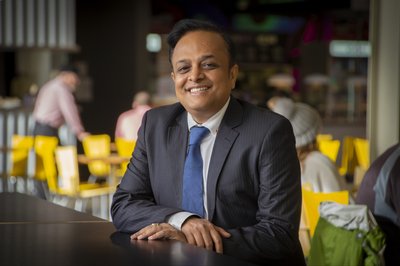
Why communication studies threatens misinformation
The infrastructure of hate is built on misinformation.
As I have documented in my scholarship, a core strategy for crafting misinformation is communicative inversion, the mobilisation of symbols to turn materiality on its head.
For example, in the hideous communicative infrastructure of the far-right, the beauty of organising in communities that have been historically marginalised by settler colonial structures to secure better health outcomes, growing food gardens, advocating for safe play areas, and participating in preventive activities is turned on its head, projected as part of a nefarious radical agenda.
For the far-right, historically marginalised communities having a say in policy-making, undoing the erasures that have been carefully scripted into settler colonial structures, is part of a global conspiracy for radical takeover. The conspiracy web of the Alt-Right sees Neo-Marxist agenda in spaces where racially marginalised communities are empowered to participate in health decision-making processes to transform the unconscionable health inequities that white settler colonies are plagued by.
Some of the profound contributions made by the discipline of communication studies include the examination of the underlying processes that drive misinformation, strategies for countering misinformation through digital literacy and community-grounded approaches, and communication solutions for building social cohesion. Communication scholars are the frontiers of developing practical solutions that address global inequalities, poverty, hunger, and climate change, among many other grand challenges. During my tenure serving as Editor-in-Chief of the Journal of Applied Communication Research, I came away awed by the quality of scholarship in the discipline, across paradigms and theoretical orientations, across sub-disciplinary spaces, contributing to solving practical problems.
In our team of researchers spread across seven countries, I am impressed by the power of communication in solving problems experienced by the marginalised. When those who have been systematically erased hold the power to tell their stories, dominant forms of disenfranchisement are challenged and transformed, creating spaces for solutions that are sustainable.
It is this transformative power of communication (especially research that maps and responds to misinformation) that threatens entrenched power structures that produce misinformation and profit from it.
Alt-right’s attack on diversity, equity and inclusion
The organised white supremacist attack on social science research on diversity, equity, and inclusion (DEI) reflects the ways in which entrenched power is threatened by impactful scholarship. Empirically-based community-engaged scholarship, built on painstaking social science research embedded in communities, is communicatively inverted, portrayed as an elaborate conspiracy hatched by an elite cabal threatening white civilisation.
Through layers of communicative inversions, scholarship on and pedagogy of DEI is labelled as racist and anti-white by white supremacists, finding a core audience base of voters organised around hate.
Academics researching and writing about inequities have been targeted with the “racist” label.
Now turning to the hit piece targeting communication and media studies I analysed earlier, I demonstrated that journalist and blogger Karl du Fresne seems to have very little understanding of the scholarly process. His construction of a global elite promoting a radical agenda is a communicative inversion of the propaganda such attacks on social justice scholarship perpetuate to protect the interests of political and economic elites. I also note here the communicative inversions that have been performed by du Fresne in attacking experts studying disinformation and hate in Aotearoa (I’m purposefully not linking those pieces here to avoid feeding the disinformation flow). Pay attention here to the online misogyny and violence, including death threats, that have been directed at the Director of the Disinformation Project, Kate Hannah.
Representing the people?
Referring to my research programme, du Fresne writes:
“The poor working schmucks whose taxes fund these institutions have no knowledge of, and even less control over, the radical agendas they enable. Unfortunately the same is true of New Zealand taxpayers who involuntarily fund activist academics and their tireless promotion of a world view that’s at odds with that of the majority of New Zealanders.”
This strategy of “speaking for the people” is often mobilised by the far-right in organising attacks on academics. In fact, across the globe, emanating largely from the US, the organised far-right attacks on academic freedom are shaped by populist rhetoric. Propagandists draw on majoritarian appeal to mobilise outside attacks on expertise, in the process seeking to destroy internal processes of institutional checks and balances within democracies. Paradoxically then, the language of accountability to taxpayers is mobilised as a critical tool by the far right in the systemic attack on institutions.
Far-right media and politicians assign themselves the role of speaking for taxpayers, concerned community members, and concerned parents (these are the three key stakeholders that the far-right assigns itself as representing) as they have taken over boards of educational institutions and passed laws directly threatening academic freedom.
Simultaneously, the far-right represents the agendas of the political and economic elite, and actively seeks to silence the voices of communities at the margins organising for change. Note the communicative inversion that erases the agency of everyday people as the discourse sets itself up to speak for the people.
Consider the condescension with which du Fresne approaches everyday citizens, whom he labels as “poor working schmucks.” This is the irony of populist far-right rhetoric that seeks to mobilise popular sentiments by fundamentally undermining the public’s capacity to know. Note also the target of the attack on institutions of democracy, specifically universities in this instance.
Far-right propagandists assign themselves the role of safeguarding ignorant publics from a sinister plot by elites seeking to take over power while actually silencing the voices of communities at the margins and safeguarding elite power and control. Note the convergence with the Trump propaganda machine that actively works to project Trump as a representative of the people in opposition to elite power, inverting the large-scale economic power held by him and his network.
The far right’s attack on education, specifically humanities and social science education, is shaped by a broader strategy that sees critical questioning as threatening to entrenched power structures. The organised attacks specifically on critical humanities and social science knowledge in the US, emergent from the Infowars-Trump-Bannon-Fox ecosystem seek to protect and perpetuate the entrenched power structures, performed as a grievance.
Moreover, du Fresne’s paragraph assumes that the “majority of New Zealanders” are at odds with a justice-based worldview (assuming that’s what he is referring to). Du Fresne doesn’t back this fairly large claim with evidence. It is worth interrogating which is the majority du Fresne is referring to.
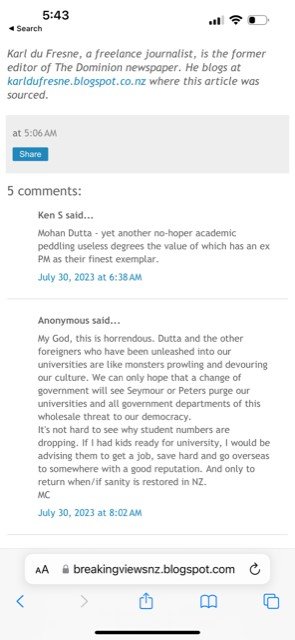
Two worlds of credentials and academic freedoms
The article then goes on to undermine my credentials – whatever du Fresne can gather up from his google search! Including:
“Dutta also appears to be good at bigging up his CV with awards and appointments – obligingly conferred, no doubt, by people who share an interest in pushing the same agendas. Demonstrations of mutual admiration are an essential part of the academic career path.”
That he doesn’t really understand how the academic community works is evidenced once again. The silly caricature of the academic community demonstrates that du Fresne has no empirical understanding of the ways in which academic awards are organised, the peer review processes that constitute academic impact, the metrics used for evaluating academics, and the nature of the evaluative processes. Once again, to actually learn about academic evaluation processes would require doing research, having an open mind, and being willing to learn.
In du Fresne’s conspiracy web, the awards I have received (not sure which ones he is referring to) have been “obligingly conferred” without a doubt “by people who share an interest in pushing the same agendas” (i.e. radical “left woke” agendas). Note how with one broad stroke he fits the entire discipline of communication (having erased sub-disciplinary areas, differences in paradigmatic approaches, etcetera.) and its major associations (mostly the National Communication Association and the International Communication Association, the two key international associations of communication academics that have conferred awards upon me) within this conspiracy web that is seemingly pushing a global agenda.
The global associations of communication studies and the standards of recognition of scholarly impact within the discipline become part of du Fresne’s conspiracy web. Note then the blanket statement about mutual admiration that apparently drives academic career paths.
I can’t help but note the hypocrisy in the framing being used here and contrast it to an earlier article I came across on his blog where du Fresne is advocating for academic freedom.
On July 29, 2021, he penned a support letter titled “dismal setback for academic freedom” defending the Listener Seven, the academics who had penned the letter stating mātauranga Māori is not science and had then received pushback from academics across the globe for the racist tropes reflected in the letter. In that defence, de Fresne depicted the Listener Seven letter writers as “respected academics.”
Within the same piece, he launched a vitriolic attack on the esteemed Māori sociologist Professor Joanna Kidman, referring derisively to the fact that she is a sociologist. Du Fresne has carried out this obsessive attack on Professor Kidman on diverse platforms. He seems to be concerned about the reputation of New Zealand (among global academics) which apparently has taken a hit because of the critiques of the Listener Seven letter, largely led by tangata whenua academics.
So who among us academics in du Fresne’s world is worthy of earning the label “respected?”
Take as one example Associate Professor of Education Dr Elizabeth Rata, one of the Listener Seven letter writers. By measures of academic impact, Dr Rata’s google scholar citation states that she has an h-index of 25 and total citation of 2347. Note also that her publications are largely in the social sciences. Communication and sociology as disciplines don’t belong in du Fresne’s vision of the academe in Aotearoa, but apparently education does!
For du Fresne, Dr Rata is counted among heretics for her uninformed critique of mātauranga Māori (in the world du Fresne inhabits, academics critiquing its position in science are performing their role as “critics and conscience”), earning her the title “respected,” while the rest of us are lumped into a radical cabal, as part of a conspiratorial elite. The same global community that is apparently losing respect for Aotearoa because of a counter letter written by academics critiquing the Listener Seven is part of a radical cabal when it comes to social justice scholarship.
Paradoxically, I note here that none of the Listener Seven academics being defended by du Fresne are qualified mātauranga Māori scholars – here’s an excellent analysis of Dr Rata’s attack on Kaupapa Māori by Dr Leonie Pihama.
It is not surprising at all that du Fresne, with his bald-faced hypocrisy, is the face of advocacy for academic freedom on the website of the Free Speech Union. Here’s his defence of the Listener Seven on the union’s website:
“In the latest outbreak of the speech wars, the action has shifted to a new and worrying arena. Seven respected university academics found themselves effectively blacklisted in July after they wrote a letter to The Listener challenging the notion that matauranga Maori – which can be defined as the traditional body of Maori knowledge – should be accorded the same status as science, as proposed by an NCEA working group preparing a new school curriculum.
“In an unprecedented pile-on, more than 2000 fellow academics, urged on by Professors Shaun Hendy and Siouxsie Wiles, signed a letter denouncing the Listener Seven and implying they condoned “scientific racism”. The response went well beyond legitimate disagreement. The sheer weight and vehemence of the denunciation sent an unmistakable message to the academic community: express dissent at your peril.”
By du Fresne’s standards, unsubstantiated claims by academics unqualified in a subject area is academic freedom and academics challenging those unsubstantiated claims are silencing dissent. Note here also the communicative inversion of power – the hegemonic ideology of colonial whiteness that continues to erase and denigrate Indigenous knowledge is turned into a dissenting view at the margins.
What this makes amply clear is that the version of academic freedom subscribed to by the Free Speech Union is one that doesn’t really understand the concept of academic freedom, and instead promotes a far-right agenda. His mobilisation for academic freedom is thoroughly uninformed, selective, and dangerously aligned with the global Alt-right’s strategic deployment of free speech to attack social justice scholarship in universities, destabilise universities and other democratic institutions, and promote conspiracy theories that mobilise majoritarian hate to uphold hegemonic power.
The foreign import scare
Du Fresne’s article then wraps up with this:
“Fourth, and perhaps most important, we can reasonably deduce that Dutta is yet another import who has embedded himself in the tertiary education system and uses his privileged position to white-ant the society that provides his living. Explicit in his profile is a commitment to radical change; whether New Zealanders want it or approve of it is immaterial.”
His deduction here is that I am an import of the wrong kind (of course, ignoring his status as manuhiri in Aotearoa). Observe closely the language that constructs me, an ethnic migrant, as embedding myself in the tertiary education system with the supposed agenda of corroding New Zealand society from within.
The anti-immigrant hate reflective of white supremacy is exaggerated and amplified by the racist audience of the blogpost.
Note here the anti-immigrant hate that is shared, replete with the dehumanising construction of foreigners as “monsters prowling and devouring our culture.” Also note the ways in which this narrative exists in continuity with the mainstreaming of anti-immigrant hate in Aotearoa New Zealand.
The scare-mongering foreign import narrative targets social justice scholarship (erasing the actual history of organising for social justice in Aotearoa) while obfuscating the US-led far-right agenda. Note here the influence of the US government as well as organisations such as Koch Foundation that deploys hate to mobilise large-scale privatisation of economies globally. It creates a seductive trope for recruiting members organised around the fear of foreign ideologies contaminating the minds of children and youth.
That this hate percolates into the mainstream of New Zealand media and politics is of grave concern to democracy here.
Professor Mohan Dutta is Dean’s Chair Professor of Communication. He is the Director of the Center for Culture-Centered Approach to Research and Evaluation (CARE), developing culturally-centered, community-based projects of social change, advocacy, and activism that articulate health as a human right. He is a member of the board of the International Communication Association.
Link to Article:
https://www.massey.ac.nz/about/news/opinion-the-far-right-misinformation-and-academic-freedom/